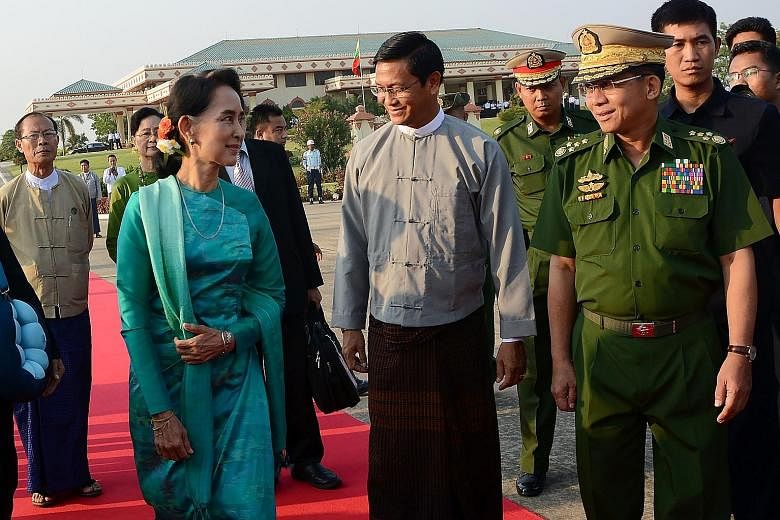NAYPYITAW • The commander-in-chief of Myanmar's military has said that the army was carrying out its duty under the leadership of the newly elected civilian government of Nobel laureate Aung San Suu Kyi, aiming to assuage worries over tension between them.
"We don't have any reason to reject the leadership of the elected civilian government," Senior General Min Aung Hlaing said at a rare news conference yesterday at the military headquarters on the outskirts of the capital Naypyitaw.
Military lawmakers had made clear their opposition to a Bill creating a powerful position of state counsellor for Ms Suu Kyi by refusing to participate in a vote on it.
But yesterday, Gen Min Aung Hlaing struck a conciliatory tone. "We're carrying out our duties under the leadership of the government. This is in accord with Constitutional provisions," he said when asked about ties between the military and Ms Suu Kyi's National League for Democracy (NLD). He said the army reported important matters to President Htin Kyaw, and, when necessary, to Ms Suu Kyi, adding the military had to seek the approval of the President when it came to certain budget matters.
Ties between the military and Ms Suu Kyi will define the success of Myanmar's emergence from decades of isolation and military rule.
In a possible sign of the NLD government aiming to keep peace with the military, its new version of the law governing public demonstrations, submitted to Parliament last week, is facing criticism from rights groups and student activists who say the ruling party is planning to retain restrictions on free speech once wielded against them by the country's former junta.
The draft Bill would punish protesters for spreading "wrong" information and make straying away from pre-registered chants an offence. It also bars non-citizens - a category that includes the largely stateless Rohingya - from protesting and lists criminal penalties for "disturbing" or "annoying" people.
The NLD says the new Bill was aimed at protecting peaceful protesters rather than penalising them. It does scrap or water down some restrictions from existing legislation, such as the article that meant activists could be hit with multiple counts of the same charge - increasing the length of the sentences that could be meted out. The draft also cuts the notice required for a protest to 48 hours and removes the need for police consent.
Still, students say the changes do not go far enough. "I think the laws which restrict people's right to demonstrate for what they want should not exist," said Mr Zayar Lwin, a leader of one of Myanmar's largest student unions.
"We are concerned that the NLD is rushing this," said Mr David Mathieson, a senior researcher at the Human Rights Watch based in Yangon.
He said there were other laws, like the penal code, that regulated potential violations by protesters, and that in its current form the Bill gave the authorities latitude to crack down on peaceful protesters.
These concerns emerge just as the United States prepares its annual decision on whether to extend its sanctions on the nation.
US ambassador to Myanmar Scot Marciel said this week that respect for human rights was a vital factor.
REUTERS

